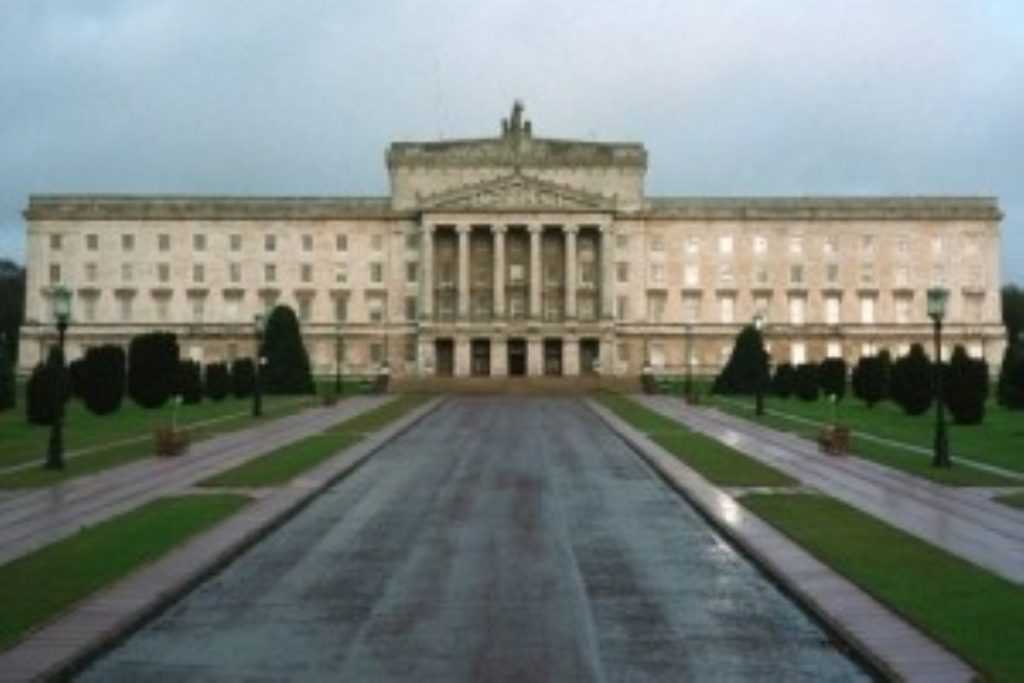Blair confident over DUP-Sinn Fein coalition
The Democratic Unionist Party (DUP) will form a government with Sinn Fein as soon as the republicans commit to supporting policing, the prime minister has said.
Tony Blair said he believed that as long as the DUP and Sinn Fein remain the two largest parties in Northern Ireland after next year’s assembly elections, Ian Paisley would be first minister and Martin McGuinness would be his deputy.
And he stressed that implementing the terms of the St Andrews agreement, which sets out a timetable for electing a new assembly and creating a devolved executive by next March, was now the “agreed way of implementing the institutions” of power sharing.
He was speaking after a fraught day at Stormont, where crunch talks on restoring devolution were disrupted by a security scare. Loyalist Michael Stone claimed to have a bomb in the entrance hall, causing a full evacuation.


But just minutes before, Mr Paisley threatened to throw the whole process into chaos by stating clearly that he would not accept the nomination for him to be first minister.
The British and Irish governments had set today as the deadline for at least an indication that both the DUP and Sinn Fein could agree on who would lead a new executive.
No-one would be appointed until March, but Northern Ireland secretary Peter Hain has said he would dissolve the Stormont assembly altogether unless there was some sign today that an agreement could be reached.
At a meeting of the transitional assembly at Stormont this morning, Sinn Fein leader Gerry Adams said he was happy to nominate Mr McGuinness, his chief negotiator, to the role of deputy.
But Mr Paisley refused to accept his nomination as first minister, saying: “The government stressed before, during and after the St Andrew’s talks that the twin pillars for agreement are DUP support for power sharing and Sinn Fein support for policing.
“Clearly as Sinn Fein is not yet ready to take the decisive step forward on policing, the DUP is not required to commit to any aspect of power-sharing in advance of such certainty.
“The circumstances have not been reached where there can be a nomination or designation at this stage.”
Mr Adams said he understood unionists’ concerns about forming a political coalition with his party, because they were expressed by republicans as well. But he stressed: “That is also a challenge which we must rise to and we must face together.”
He said the DUP and Sinn Fein had “a lot in common”, noting: “We are all here also as equals and we have a duty to govern for the sake of all our peoples. We also share a view that British direct rule is bad rule – our people deserve better.”
But the deadlock between the two sides was clearly demonstrated when Mr Adams nominated Mr McGuinness as deputy first minister, saying he would be “a champion for equality and fairness and justice”. His words were met with laughter from unionists.
However, speaking from Downing Street later in the day, Mr Blair said he understood that if Sinn Fein agreed to the “proper and full support” of policing by the Police Service of Northern Ireland (PSNI) and the rule of law, the DUP would share power with them.
“If there is proper and full-hearted committed to policing and the rule of law then there is proper and full hearted commitment to power-sharing and equality, and after all, peace in return for power sharing is what this process from the Good Friday agreement onwards has always been about,” he said.
“So everyone knows what we now must do. But despite all the difficulties, and we can see it again today very graphically, I found at St Andrews and since an underlying determination among the parties not to allow this opportunity to pass.”









